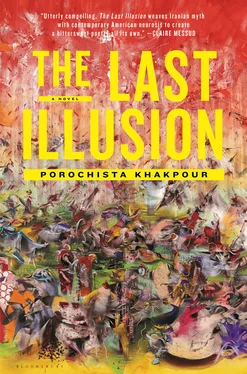He had thought about it for a moment and then said, Well, I will go then. I will promise to go.
But there was more: And, Tony, have a child. You of all people should have a child. You’ve always wanted one, and I can’t imagine a better father. Please marry. Please have one.
He shook his head. Now that, darling, I will not promise.
She had rolled her eyes at him, like he was the student again, struggling over a sestina or pretending to.

She was fifty-two when she died. He thought of her every day after that, often many times a day, determined not to let the image, sound, smell, feel of her slip at all, in a land where nobody ever reminded him of her.
And then years later, there in that other land, the minute he got to the Tehran airport, he saw bits of her everywhere. Previously, in New York, all he could do was make the routine visit to Great Neck, the Iranian enclave in Long Island, to get certain Persian groceries she would buy — saffron, sumac, a certain type of walnut cookie, Persian tea, yogurt soda — and would often eat alone at a Persian restaurant. It was painful — it would take him back to her, to them, and at some point he’d realized it had become a part of his culture, too, this other world of hers. Now at the airport, here it all was, all of it— hers : her people, her land, vibrant to him in spite of the chadors and pollution and mostly foreign chatter. When he saw the filmmaker come toward him, his camera in hand, he looked like more than a middleman — he was almost a relative. After all, what do you call a man who brings you to your son?
When he saw Zal at the special care home the next day, he had to literally clamp his teeth down hard on his tongue to prevent himself from crying out and gasping. It wasn’t just his twisted posture, his tiny bones, the eerie otherworldly sounds he immediately hurled at his intruder. It wasn’t the atrocity, but the beauty: his eyes. Was it a trick of memory, a trick of one type of love now overlapping and overwhelming another type of love? Was it the emotional overpowering the optical, or was it actually the truth, reality plain and simple — that Zal’s eyes were Nilou’s eyes? And the frame: in his little face, they were it — he was all eyes, just like Nilou, eyes that were mostly whites, eyes set upon devouring the world, eyes that were perpetually in wonder, and maybe, now that he was seeing it properly, some horror. If he had any doubt before, the doubt was gone.
It had been twenty-five years without her, and yet who would have believed in a million years, much less twenty-five, that he would actually be able to claim this fully Iranian child after all, a child so like the hero of the old epic poem she once introduced him to — a boy who had come to life by bird and almost bird alone. After all, he thought, Zal was also their child, their broken child, the fruit of their long-gone selves, forever bantering in the dim orange light of those endless office hours where lyric and stanza were twisted and turned and torn and reattached.
It’s the most beautiful allegorical tale I’ve heard, he had said to her that evening, when she read until her voice began to crack. Finally done, she had triumphantly slammed the thick, worn, old Iranian hardcover on her desk. It had the weight of a phone book and the look of a Bible, he remembered thinking.
Allegory! she had cried, her laughter more disdainful than ever. Try telling that to any self-respecting Iranian! She had made Hendricks promise that he wouldn’t try to write about it— I don’t think you’re there yet, not sure you’ll ever be— and he had, with some will, allowed it to fade away from his consciousness.
And now here he was, as if he’d never left it. It was like a fairy tale, a thing for novels, the type of turnaround you’d read in romantic epics, poetry of another time altogether.

Hendricks courted skeptics from around the world — those who doubted a feral child could grow into a functional human, as well as those who questioned just how feral Zal had been to begin with. The idea that Hendricks’s love alone had caused the miracle, the very miracle of his son’s endurance, floated precariously — and while no one would call it a recovery, per se, they allowed these as advancements of an unheralded magnitude.
There were times Hendricks wondered to what degree Khanoom really had come in contact with Zal. Was it possible it was more than Zari had said on film? Was he really fully feral? Was it more than the doctors wanted to believe? To what degree had their imaginations filled the holes, and to what degree did his reality challenge them?
There were some things they would never know. Ask Zal about Khanoom and he would look blank, blinking neutrally. He would not recognize the name, not even understand the reference. Sometimes not knowing and not understanding would make him scared. Hendricks would simply hold him and let him know that it did not make him any different from many people, people like himself even, who had in some ways also been raised without a parent.
You are all right, son , Hendricks would always tell him, over and over. As all right as any of us.
Little by little, Zal began to surprise them. They said language would not come to him, would never come to him; by the time Zal was fifteen he could speak and read on the level of a ten-year-old.
I am all right, he eventually said back, and eventually even fully understood.
They said his body would forever remain deformed — but nine surgeries later, Zal went from a walker to standing upright on his own, with aches and pains and inflammations not so different from those of someone with MS.
So, unlike his infinitely masculine namesake, he did not resemble a cypress, he was not capturing beauty queens, and he was not saving the world, but if you looked at him for the first time, you’d have to be awfully tipped off to find something amiss. Here stood Zal of just over two decades — a man, finally a man — Hendricks thought, never mind how badly circumstances had distorted his age. He was five feet seven inches, not horribly short, though they all assumed even getting to such a height meant that if he had grown up under normal conditions he’d be well over six-two. He was thin but not emaciated, definitely too thin, but not in a way that disgusted. His skin was pale and was prone to irritations — burns, eczema, acne, the works — but nothing so different from the usual blemishy human. And his hair was still fair, still blond, but the white blond had, thanks to sun exposure, faded a bit more into a dull brass. His eyes were black and still huge, still like Nilou’s wonderful dreamer eyes, though they revealed nothing — and in some ways Hendricks preferred them to hers, in that strangely sincere blankness. Hendricks imagined Zal was what some wandering poet girl, some eccentric artist with a romantic edginess, might consider good-looking.
They said he would not be capable of experiencing human emotions, but Hendricks witnessed them all: the embrace out of nowhere he once or twice got, the welling of tears during frustrated episodes, the fear the fear the fear. True, there was no laughter, there was no smile, but that would require a time machine to fix. The thing Hendricks and ultimately the therapist to whom he entrusted Zal — his colleague, the eminent child psychologist Gerald Rhodes — were most grateful for was the obvious: that Zal, in his adulthood, had lost his association with birds, that he finally did not and would not and really could not consider himself a bird, that birds and their natures were about as foreign to him as unicorns and griffins.
Читать дальше














